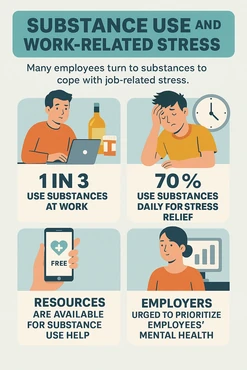Results showed that financial pressures top the list of stressors
-
A new nationwide survey found that many employees turn to substance use to cope with job-related stress.
-
The survey revealed that one in three respondents use substances at work, while 70% use substances daily as a means of stress relief.
-
There are free resources available to consumers looking for substance use help, and employers are also urged to take steps to prioritize employees mental health.
 A new study conducted by SubstanceAbuseCounselor.org looked at substance use in the job market.
A new study conducted by SubstanceAbuseCounselor.org looked at substance use in the job market.
The survey revealed that many employees are turning to substance use to deal with job-related pressures, and one in three respondents use substances at work.
Rebecca Turley, Content and Research Lead at SubstanceAbuseCounselor.org, talked to ConsumerAffairs about the biggest risks of using substances for stress relief, free resources consumers can turn to, and how employers can help ease their employees burden of stress.
The survey
Experts had 1,000 American workers and job seekers answer questions related to their work life and substance use. Participants represented a variety of industries, age groups, and employment statuses.
The questions focused on areas like workplace culture, mental health support systems, economic strain, and more.
Key findings
Some key findings from the survey include:
-
Nearly 70% of both Gen Z and millennial employees use substances daily to cope with job-related stress.
-
Financial stress is the primary target for all age groups baby boomers, Gen X, millennials, and Gen Z.
-
25% of Gen Z employees and 33% of millennial employees have increased substance use due to pressures related to layoffs and/or the adopting of artificial intelligence (AI) in the workplace.
-
33% of workers use substances on the job; of that group, 11% say that their employers are aware.
-
34% of Gen Z employees and 29% of millennial employees have sought professional help, or considered seeking out professional help, for substance use.
The risks of substance use
According to Turley, substance use at work or as a result of work-related stressors, can branch out and affect other areas of employees lives.
This quick fix often has a ripple effect that causes financial strain, career stagnation, and even health deterioration, she said. Its pretty scary that one in three millennials in our study admitted that their substance use behavior has already damaged their career progress, and to add insult to injury, two in five workers feel like they need to use a substance to merely meet job expectations.
Turley says seeking out professional help is always the best course of action for anyone considering substance as a means of stress relief.
If you catch yourself looking at substances as a way out or a means to cope, thats a sign youre overwhelmed. Instead, try acknowledging the stress and seek help, whether thats a therapist, support group, or a trusted HR contact.
Honestly, even if you feel like thats daunting, if you have a close support network in your personal life, talking to one of them can help, and they can help you with the heavy lifting; maybe they have some prior experience with a similar situation, or know someone that has. You dont have to hit rock bottom to deserve support either, and early intervention can help protect your mental health and livelihood.
Finding support
Turley shared that there are many ways that consumers can seek out help that are free of charge. Additionally, there are ways employers can step in and help ease their employees stress.
Theres national hotlines like SAMHSAs (1-800-662-HELP) which provide free, confidential support 24/7, she explained. Quite a few state and local nonprofits also offer sliding-scale counseling.
If you are employed, check with your HR department to see if they have an Employee Assistance Program. These are often underused, but can help connect you to free mental health and substance use resources.
Employers also play a huge role, and need to be doing more. Easy steps like offering mental health days is a no brainer, expanding Employee Assistance Programs, and normalizing open conversations around stress, can have huge benefits with your employees. Our research found that less than 20% of workers feel supported by their employers, and if thats not a call to do better, I dont know what is.
Sign up below for The Daily Consumer, our newsletter on the latest consumer news, including recalls, scams, lawsuits and more.
Posted: 2025-05-12 01:36:41


















